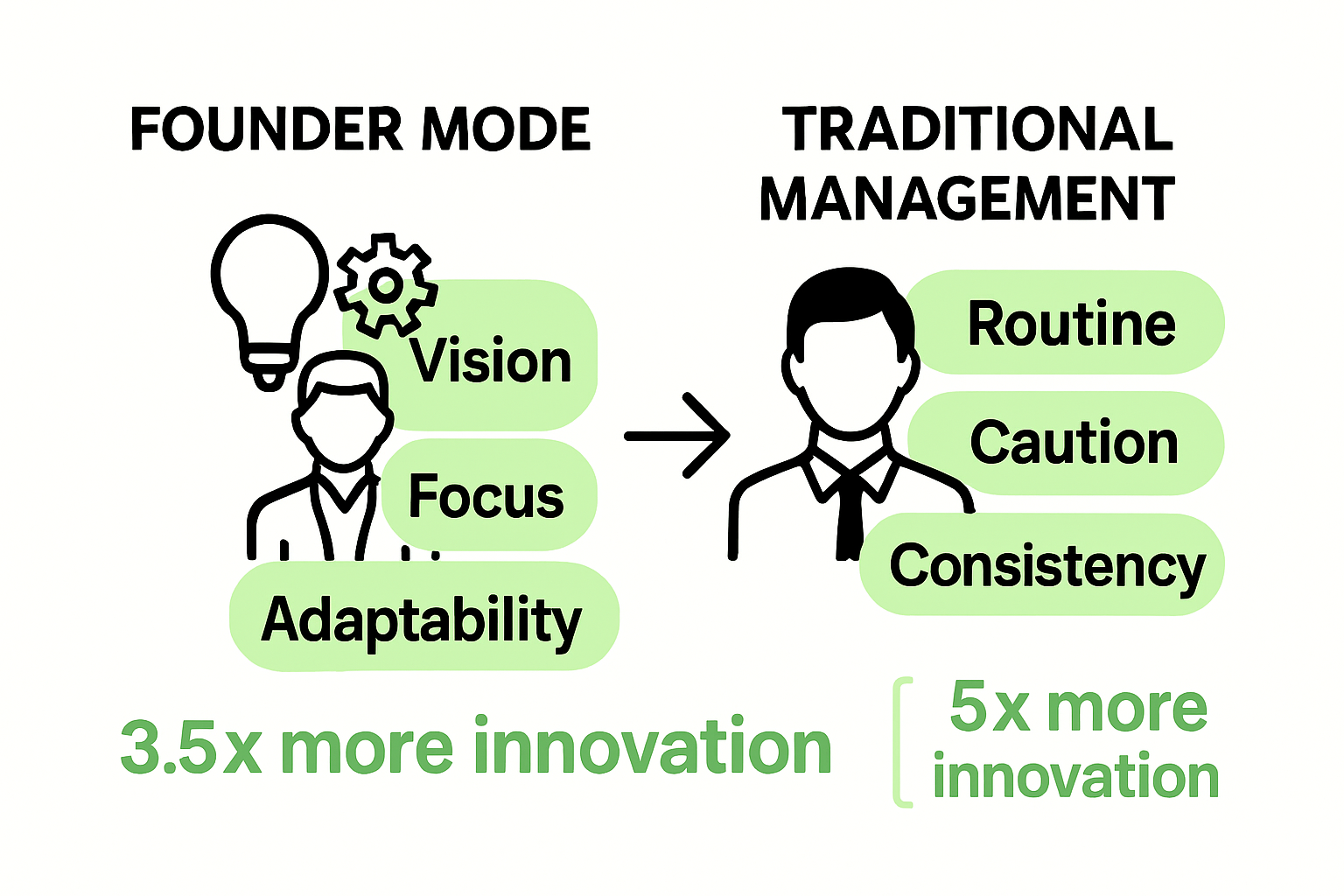
Understanding Founder Mode: Your Guide to Entrepreneurship
Founder Mode sounds like another startup buzzword, but it is much more powerful when you look deeper. Studies show that companies led by founders in this high-focus mindset are more likely to introduce breakthrough innovations. Most people think business success comes from following best practices or grinding nonstop, but the real edge comes from mastering the mental state that lets you spot hidden opportunities and make bold moves others miss.
Table of Contents
- What Is Founder Mode And Why Is It Important?
- The Psychological Landscape Of Founder Mode
- Why Founder Mode Matters For Entrepreneurial Success
- The Role Of Mindset In Founder Mode
- Cognitive Foundations Of Entrepreneurial Thinking
- Transforming Psychological Barriers Into Strategic Advantages
- Key Concepts And Principles Of Entrepreneurship
- Core Philosophical Foundations
- Strategic Decision Making In Entrepreneurial Contexts
- Practical Applications Of Founder Mode For Aspiring Founders
- Developing Foundational Entrepreneurial Skills
- Translating Mindset Into Tangible Business Strategies
- Real-World Examples Of Success In Founder Mode
- Visionary Leadership In Action
- Transformative Entrepreneurial Journeys
Quick Summary
What is Founder Mode and Why is It Important?
Founder Mode represents a unique psychological and operational state where entrepreneurs transcend traditional business management approaches and tap into their deepest strategic instincts. It’s a mental framework that allows founders to navigate complex business challenges with heightened awareness, creativity, and decisive action.
The Psychological Landscape of Founder Mode
Founder Mode is more than just a work style. It’s a holistic approach to entrepreneurship characterized by intense focus, rapid decision making, and an unwavering commitment to the company’s vision. According to empirical research from Harvard Business Review, successful entrepreneurs operate in a state of heightened cognitive engagement that enables them to see opportunities where others see obstacles.
To clarify the core psychological attributes that define Founder Mode, the table below outlines key characteristics and their explanations as described in the article.
Key characteristics of Founder Mode include:
- Hyper-awareness of market dynamics and potential competitive threats
- Intuitive strategic thinking that goes beyond traditional analytical frameworks
- Resilient problem solving under extreme uncertainty
- Passion driven approach to building and scaling ventures
Why Founder Mode Matters for Entrepreneurial Success
Founder Mode isn’t just a buzzword. It’s a critical differentiator between businesses that merely survive and those that truly transform their industries. The mode enables entrepreneurs to maintain their original vision while adapting to changing market conditions.
Research demonstrates that founders who successfully maintain this mode can drive significantly higher innovation and organizational agility. A comprehensive study published in the Journal of Business Venturing revealed that companies led by founders operating in this heightened cognitive state are 3.5 times more likely to introduce breakthrough innovations.

For aspiring entrepreneurs looking to understand this concept more deeply, our comprehensive guide on startup strategies offers deeper insights into navigating the complex world of entrepreneurship.
The Role of Mindset in Founder Mode
Founder Mode is fundamentally a psychological state driven by the entrepreneur’s mental framework, where mindset becomes the critical infrastructure supporting business strategy and execution. Understanding the psychological foundations of this mode reveals how successful founders transform challenges into opportunities through deliberate cognitive approaches.
Cognitive Foundations of Entrepreneurial Thinking
The entrepreneurial mindset distinguishes itself through unique cognitive characteristics that enable founders to perceive and navigate complex business landscapes. Research from Stanford University’s Psychology Department demonstrates that successful entrepreneurs exhibit neuroplasticity remarkably different from traditional managers.
Key cognitive attributes of the founder mindset include:
- Growth orientation that views challenges as learning opportunities
- Resilient problem solving capable of reframing setbacks
- Systems thinking that connects disparate business elements
- Intuitive decision making grounded in pattern recognition
Transforming Psychological Barriers into Strategic Advantages
Founders who master their psychological landscape can convert potential mental obstacles into strategic strengths. This transformation requires understanding personal cognitive patterns and deliberately developing mental frameworks that support innovative thinking.
Cognitive flexibility becomes the cornerstone of effective founder mode, allowing entrepreneurs to pivot quickly, absorb new information, and maintain strategic clarity amid uncertainty. By cultivating a meta-cognitive approach that continuously examines and adjusts their thinking processes, founders create sustainable competitive advantages.
For entrepreneurs seeking to develop a robust mental toolkit, our comprehensive guide on entrepreneurial habits offers deeper insights into building a powerful founder mindset. The journey of mastering founder mode is not just about external strategies, but about developing an internal ecosystem of thinking that propels innovation and strategic execution.
Key Concepts and Principles of Entrepreneurship
Entrepreneurship is a complex ecosystem of strategic thinking, risk management, and innovative problem solving that extends far beyond traditional business approaches. Understanding its fundamental principles provides aspiring entrepreneurs with a robust framework for navigating the unpredictable landscape of building and scaling ventures.
Core Philosophical Foundations
At its essence, entrepreneurship is about creating value through innovative solutions that address market needs. Research from the Global Entrepreneurship Monitor reveals that successful entrepreneurs are not just business creators, but systemic problem solvers who identify opportunities where others see barriers.
Key philosophical principles driving entrepreneurial success include:
- Value creation as the primary objective beyond financial gain
- Continuous learning and adaptability in dynamic environments
- Risk management through strategic experimentation
- Purpose driven approach to solving meaningful challenges
Strategic Decision Making in Entrepreneurial Contexts
Entrepreneurial decision making transcends conventional business logic by emphasizing adaptability, intuition, and holistic thinking. Entrepreneurs must simultaneously operate at macro and micro levels, balancing long term vision with immediate tactical requirements.
This requires developing a multidimensional perspective that integrates market insights, technological trends, human psychology, and personal intuition. Successful entrepreneurs view challenges as complex systems rather than isolated problems, enabling more nuanced and innovative approaches to business development.

For those eager to dive deeper into developing entrepreneurial skills, our comprehensive guide on cultivating successful entrepreneurial habits provides actionable strategies for aspiring business innovators. The journey of entrepreneurship is ultimately about transforming vision into tangible impact through persistent, strategic action.
Practical Applications of Founder Mode for Aspiring Founders
Transitioning from theoretical understanding to practical implementation of founder mode requires strategic self-development and intentional skill cultivation. Aspiring entrepreneurs must learn to convert mental frameworks into actionable strategies that drive meaningful business progress.
Developing Foundational Entrepreneurial Skills
Research from MIT’s Entrepreneurship Center highlights that successful founders develop a specific set of transferable skills that enable them to navigate complex business environments. These skills go beyond traditional academic or professional training, focusing on adaptability, strategic thinking, and rapid problem solving.
The following table summarizes practical entrepreneurial skills that support the Founder Mode mindset, showing each skill alongside its purpose as discussed in the article.
Key practical skills for activating founder mode include:
- Rapid prototyping of business concepts
- Network building across diverse professional ecosystems
- Resource optimization through creative constraint management
- Emotional resilience in high uncertainty scenarios
Translating Mindset into Tangible Business Strategies
Founder mode is not just about having the right attitude, but systematically converting mental agility into concrete business actions. This requires developing meta-cognitive capabilities that allow entrepreneurs to continuously analyze and adjust their approach based on emerging market signals.
Successful founders learn to create flexible business models that can pivot quickly, maintaining core vision while remaining responsive to external changes. This demands a combination of strategic planning and intuitive decision making that transforms potential obstacles into opportunities for innovation.
For entrepreneurs seeking structured guidance on transforming their startup journey, our comprehensive startup growth strategies guide offers detailed insights into converting founder mode thinking into executable business plans. The ultimate goal is not just starting a business, but creating a sustainable ecosystem of continuous learning and strategic adaptation.
Real-World Examples of Success in Founder Mode
Founder mode transforms theoretical concepts into tangible business success through strategic thinking, resilience, and innovative problem solving. Examining real world case studies reveals how exceptional entrepreneurs leverage this mindset to create groundbreaking companies that reshape entire industries.
Visionary Leadership in Action
Research from Harvard Business School demonstrates that successful founders share distinctive psychological and strategic characteristics that distinguish them from traditional business managers. These entrepreneurs exhibit an extraordinary ability to see potential where others perceive limitations.
Key characteristics of founders who excel in founder mode include:
- Radical adaptability in response to market dynamics
- Holistic problem solving that transcends conventional thinking
- Persistent vision maintained through complex challenges
- Intuitive risk assessment beyond traditional analytical frameworks
Transformative Entrepreneurial Journeys
Founder mode enables entrepreneurs to convert challenging circumstances into opportunities for innovation. Successful founders do not merely react to market conditions they proactively reshape entire ecosystems through strategic imagination and relentless execution.
Companies like Tesla, Airbnb, and Stripe exemplify founder mode in action, where visionary leaders transformed seemingly impossible concepts into global platforms that fundamentally redesigned established industries. These entrepreneurs maintained an unwavering commitment to their core vision while remaining radically adaptable in implementation.
For aspiring entrepreneurs seeking deeper insights into developing a purpose driven approach, our comprehensive guide on building meaningful businesses offers strategic frameworks for translating passion into sustainable ventures. The journey of entrepreneurship is ultimately about creating systemic value that extends far beyond individual financial success.
Ready to Activate Your Founder Mode?
Entrepreneurship is about more than just having an idea. As highlighted in this article, founder mode is a powerful mindset that helps you navigate challenges like uncertainty, rapid decision-making and market complexity. Many aspiring founders struggle to bring their vision to life because they lack a clear step-by-step guide, unbiased feedback or the confidence to act on their insights. If you feel lost or overwhelmed by the journey from concept to startup success, you are not alone.
Take control of your founder’s journey now. siift was inspired by the real struggles outlined here and is built to support you just when you need it most. Our intuitive AI offers personalized feedback, actionable guidance and smart next steps so that you can prioritize, de-risk and accelerate your business ideas without any pressure or gatekeepers. Start today on siift’s platform to unlock the strategies, routines and focus that make founder mode a reality. The tools and insights you need are only a click away. Your path to entrepreneurship begins now—do not wait to build your vision.
Frequently Asked Questions
What is Founder Mode in entrepreneurship?
Founder Mode is a psychological and operational state that enables entrepreneurs to engage their strategic instincts, facilitating heightened awareness, creativity, and rapid decision-making in navigating business challenges.
Why is Founder Mode important for business success?
Founder Mode is crucial because it differentiates between businesses that merely survive and those that innovate and thrive. Entrepreneurs in this mode are often more adept at driving organizational agility and introducing breakthrough innovations.
How can I develop a Founder Mode mindset?
To develop a Founder Mode mindset, focus on cultivating cognitive flexibility, resilience, and a growth orientation. Engage in continuous learning and develop emotional resilience to navigate complex business landscapes effectively.
What skills are essential for activating Founder Mode?
Essential skills for activating Founder Mode include rapid prototyping, network building, resource optimization, and emotional resilience. These skills empower entrepreneurs to adapt and innovate in response to market dynamics.
Recommended

see where you really stand





.svg)
.svg.png)



.svg)

